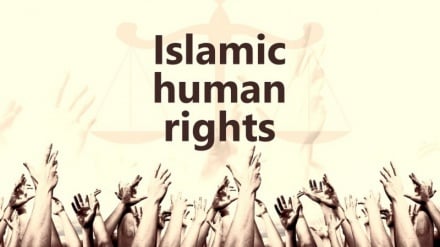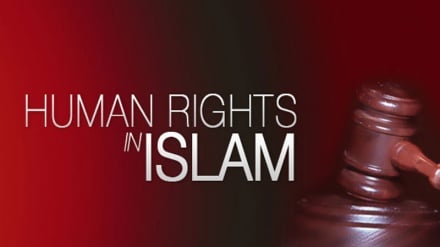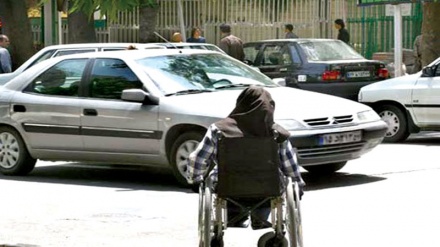Islamic Human Rights (38)
Welcome to today’s episode of the series Islamic Human Rights. Today, we become familiar with view of Islamic human rights toward collective freedoms.
Collective freedoms are part of the fundamental freedoms of mankind. Members of the community gather around as the result of their commonalties, and declare their existence with the usage of means and facilities which have been provided for a collective life. This existence is a fact which the community should recognize. An open political atmosphere leads to entry of people to social and political scenes. Meanwhile, the social trait of mankind leads to centralization of the followers of one of common thoughts in a location, and results in manifestation of several ideological hubs in the form of political, religious, social, and guild-related groups and parties. Each of these groups and parties are joined by individuals who maintain the same beliefs. Meanwhile, in these groups, the God-given talents of individuals flourish, and collective development takes place. Furthermore, these groups play an active role, bonding people and the government. In this manner, upon the assembly of individuals, who wield negligible power, a collective power emerges, setting the stage for active participation of people in administration of the country’s affairs.
Collective freedoms are part of civil and political rights, which have been emphasized in global texts.
The 20th Article of the Universal Declaration of Human Rights stipulates everyone maintains the right to freely form peaceful groups and assemblies.
Islam is a social religion which refers to the goal behind divine appointment of prophets as guidance of human community toward establishment of justice. Islam has on several occasions addressed people in Holy Quran. Meanwhile, it seems that the ayahs which have mentioned groups can be divided into two general classifications.
In the first classification of ayahs, group is comprised of faithful individuals, who maintain the same beliefs.
For instance, the 22nd ayah of Surat Al-Mujadilah notes: “You will not find a people believing in Allah and the Last Day endearing those who oppose Allah and His Apostle even though they were their own parents, or children, or brothers, or kinsfolk…They are Allah’s confederates. Look! The confederates of Allah are indeed felicitous.”
In this ayah, two traits have been taken into account for the confederates of Allah, which are maintenance of faith in God and the Day of Resurrection, and preference of these two beliefs to personal and collective interests. In the view of this ayah, an appropriate establishment is the one that has been based on faith in God, which cannot be shaken by anything, even by bonds with associates.
The 55th and 56th ayahs of Surat Al-Ma’idah note: “Your guardian is only Allah, His Apostle, and the faithful who maintain the prayer and give the zakat while bowing down. Whoever takes for his guardians Allah, His Apostle and the faithful should know that the confederates of Allah are indeed the victorious.”
In these ayahs, another feature of an appropriate group and establishment in the view of Holy Quran has been pointed out, which is acceptance of the guardianship of Allah, His Apostle and the faithful. So in the view of Holy Quran, an appropriate group and party is the one which has accepted the idea of divine rule and divine rulers as a principle in its political activities.
Given the said ayahs, the three features of faith in God, acceptance of divine rulers, and preference of these two principles to personal and collective interests have been named as the benchmarks and features of appropriate establishments. In this manner, Holy Quran permits entry to such groups and considers membership in these groups as a means to attain victory and salvation.
The second classification of ayahs contains the ones which have mentioned inappropriate groups, such as Satan’s confederates.
The 19th ayah of Surat al-Mujadilah notes: Satan has prevailed upon them, so he has caused them to forget the remembrance of Allah. They are Satan’s confederates. Look! Indeed it is Satan’s confederates who are the losers!
On this basis, a group which doesn’t remember God is considered as an inappropriate group and establishment, otherwise referred to as Satan’s confederates.
Another ayah refers to the bitter fate of Satan’s confederates.
The 6th ayah of Surat al-Fatir notes: “Satan is indeed your enemy, so treat him as an enemy. He only invites his confederates so that they may be among the inmates of the Blaze.”
Furthermore, the 36th and 37th ayahs of Surat Maryam note: ‘Indeed Allah is my Lord and your Lord. So worship Him. This is a straight path.’ But, the factions differed among themselves. So, woe to the faithless at the scene of a tremendous day.
On this basis, in the view of Holy Quran, the groups which derail from the righteous path of the prophets are introduced as inappropriate establishments. Thus, differences of opinion in groups are appropriate in the view of Holy Quran as long as it would not derail the group from the righteous path.
The 52nd, 53rd, and 54th ayahs of Surat al-Mu’minun note: “Indeed this community of yours is one community, and I am your Lord, so be wary of Me. But, they fragmented their religion among themselves, each party exulting in what it had. So leave them in their stupor for a while.”
On the basis of this ayah, appropriate differences of opinion are the ones which do not disturb the unity of Ummah.
It can be concluded that with the study of ayahs of Holy Quran, one can realize the features of appropriate and inappropriate establishments in the view of this Holy Book. In accordance to Holy Quran, entry to appropriate establishments is allowed and leads to victory and salvation, while entry to inappropriate establishments is not permitted. So, Holy Quran recognizes the freedom of groups, with due regard to stated criteria.
MR/ME


